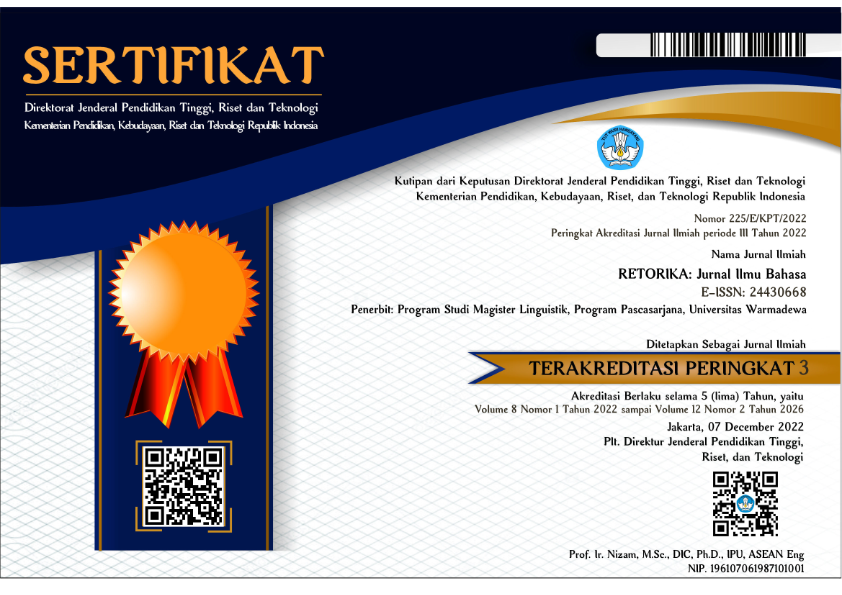Hastag War on Social Media: Unraveling Framing Strategies in the Duel #2019GantiPresiden Vs. #DiaSibukKerja
Abstract
Social media has emerged as the primary avenue for individuals to articulate their political and social stances. Hashtag wars, a prevalent phenomenon, witness divergent groups utilizing hashtags to promote their agendas and express viewpoints. Within the political realm, these hashtag battles often serve as arenas for discourse and mass mobilization. This study aimed to unveil the framing strategies employed in the hashtag war between #2019GantiPresiden and #DiaSibukKerja on social media. Utilizing a content analysis approach, the research scrutinizes hashtag usage, conveyed messages, and user responses. Various framing techniques, including episodic and thematic framing, alongside positive and negative framing, are analyzed. Moreover, the research explores the influence of social media usage and user interactions on the dissemination of political messages during hashtag wars. Findings indicate the dominance of #2019GantiPresiden in the social media hashtag war. The framing strategies and political discourse of both hashtags serve distinct purposes. #2019GantiPresiden utilizes sentiment-driven or provocative language to highlight dissatisfaction with Jokowi's leadership, while #DiaSibukKerja underscores Jokowi's achievements, emphasizing stability and success. In terms of hashtag impact, #2019GantiPresiden effectively influences public opinion and garners widespread support. Conversely, #DiaSibukKerja succeeds in portraying Jokowi's leadership positively. The practical implications of this research can aid stakeholders in politics and social media to comprehend effective framing techniques for disseminating political messages through digital platforms.
References
Astari, I. J. (2018). Development of Tourism in the Traditional House of Beleq Village in Increasing the Income of the Community Around the Traditional House in Sembalun District in 2018. Society, 9(1), 51-63.
Arikunto, S. (2010). Research Methods. Jakarta: PT Rineka Cipta, 173.
Chaer, A. (2014). General Linguistics. Jakarta: PT Rineka Cipta.
Chaer, A. (2015). Indonesian Morphology (Process Approach). Jakarta: PT Rineka Cipta.
Diniarti, M., Paridi, K., & Burhanuddin, B. (2022). Toponymy of the Name of a Hamlet in Batu Mekar Village, Lingsar District, West Lombok Regency. Copula: Journal of Language, Literature, and Education, 4 (2), 17-28.
Halfian, W. O., Hariyati, H., & Masri, F. A. (2022). Toponymy of Street Naming in Lasalepa District, Muna Regency. Journal of Indonesian Language and Literature Education Metalingua, 7 (1), 35-50.
Koentjaraningrat. (2009). Introduction to Anthropology. Jakarta: Rineka Cipta.
Kridalaksana, H. (2009). Word Formation in Indonesian. Jakarta: PT Gramedia Pustaka Utama.
Maruti, E. S., & Cahyono, B. E. H (2021). Absolute Antonyms in Javanese: A Study of Lexical Semantics. Diglossia: Journal of the Study of Language, Literature and Teaching, 4 (4), 387-400.
Mahsun, M. (2019). Language Research Methods: Strategy, Method, and Stages
The technique (third edition). Depok: PT Raja Grafindo Persada.
Moleong, L. (2010). Research Methods. Jakarta: Rineka Cipta.
Pateda, M. (2010). Lexical and Cultural Semantics. Jakarta: Rineka Cipta.
Sibarani, R. (2004). Anthropolinguistics. Medan: Poda Publishers.
Sudaryanto, S. (2015). Methods and Various Techniques of Language Analysis: An Introduction to Linguistic Cultural Vehicles (revised edition). Yogyakarta: Sanata Dharma University Press.
Sudaryat, Y. et al. (2009). Toponyms of West Java (Based on Folklore). Bandung: Department of Tourism and Culture of West Java Province.
Sugiyono, (2012). Understanding Qualitative Research. Bandung. Alphabet.
Umaruddin, D. 2019. Agrarian Conflict in Sembalun District, East Lombok Regency, West Nusa Tenggara 1979-2019. Widya Sosiopolitika Scientific.
Wijayanti, I. & Solikatun, S. (2021). Behavior of the Sembalun Lawang Village Community in Preserving Local Cultural Values to Increase Tourism. In Proceedings of the National Seminar on Sociology (Vol. 2, pp. 299-308). Sociology Study Program.
Copyright (c) 2024 RETORIKA: Jurnal Ilmu Bahasa

This work is licensed under a Creative Commons Attribution-ShareAlike 4.0 International License.
This journal provides immediate open access to its content on the principle that making research freely available to the public supports a greater global exchange of knowledge.
All articles published Open Access will be immediately and permanently free for everyone to read and download. We are continuously working with our author communities to select the best choice of license options, currently being defined for this journal as follows: Creative Commons-Non Ceomercial-Attribution-ShareAlike (CC BY-NC-SA)
 Abstract viewed = 48 times
Abstract viewed = 48 times
 PDF downloaded = 21 times
PDF downloaded = 21 times

2.png)














